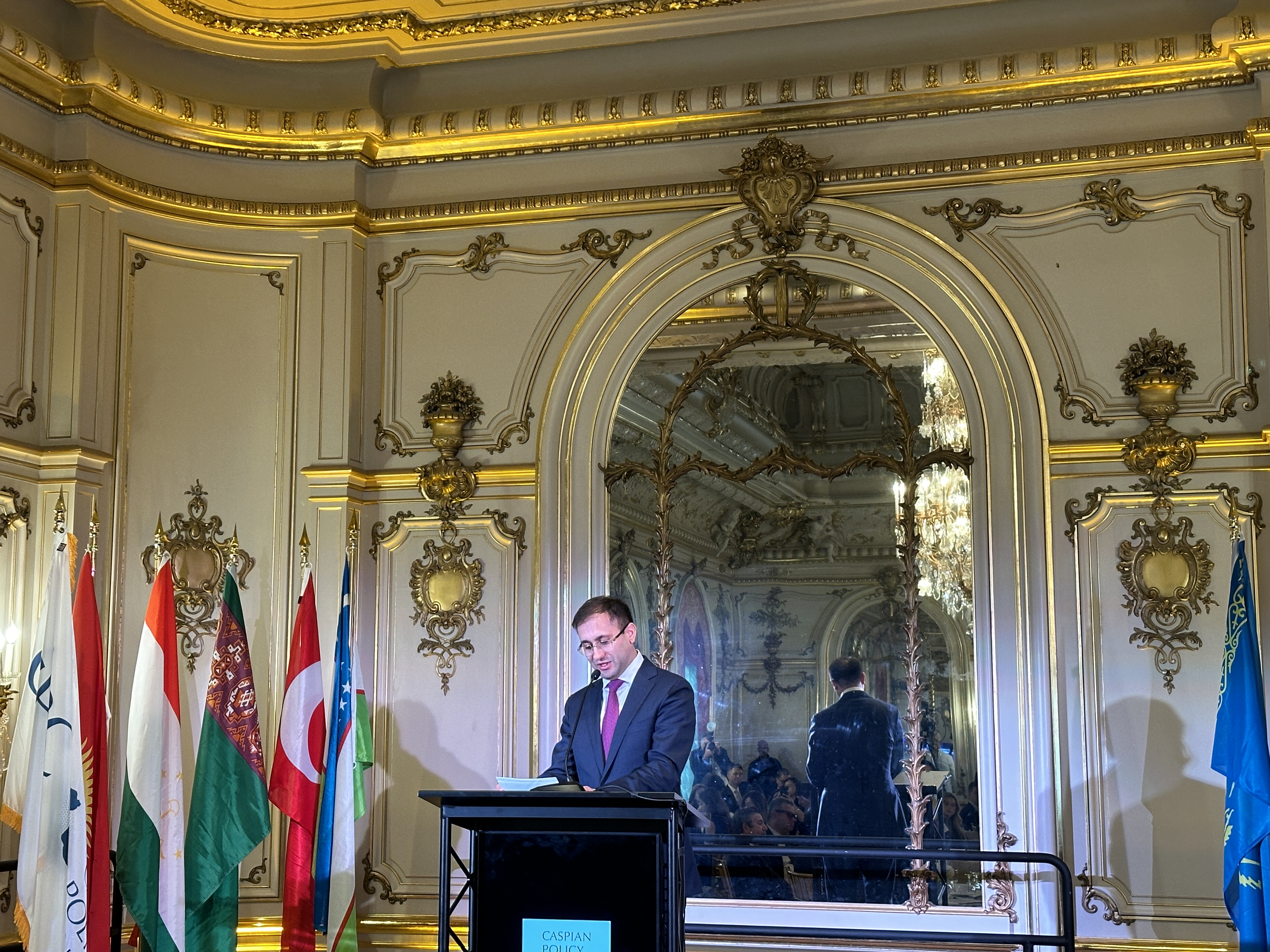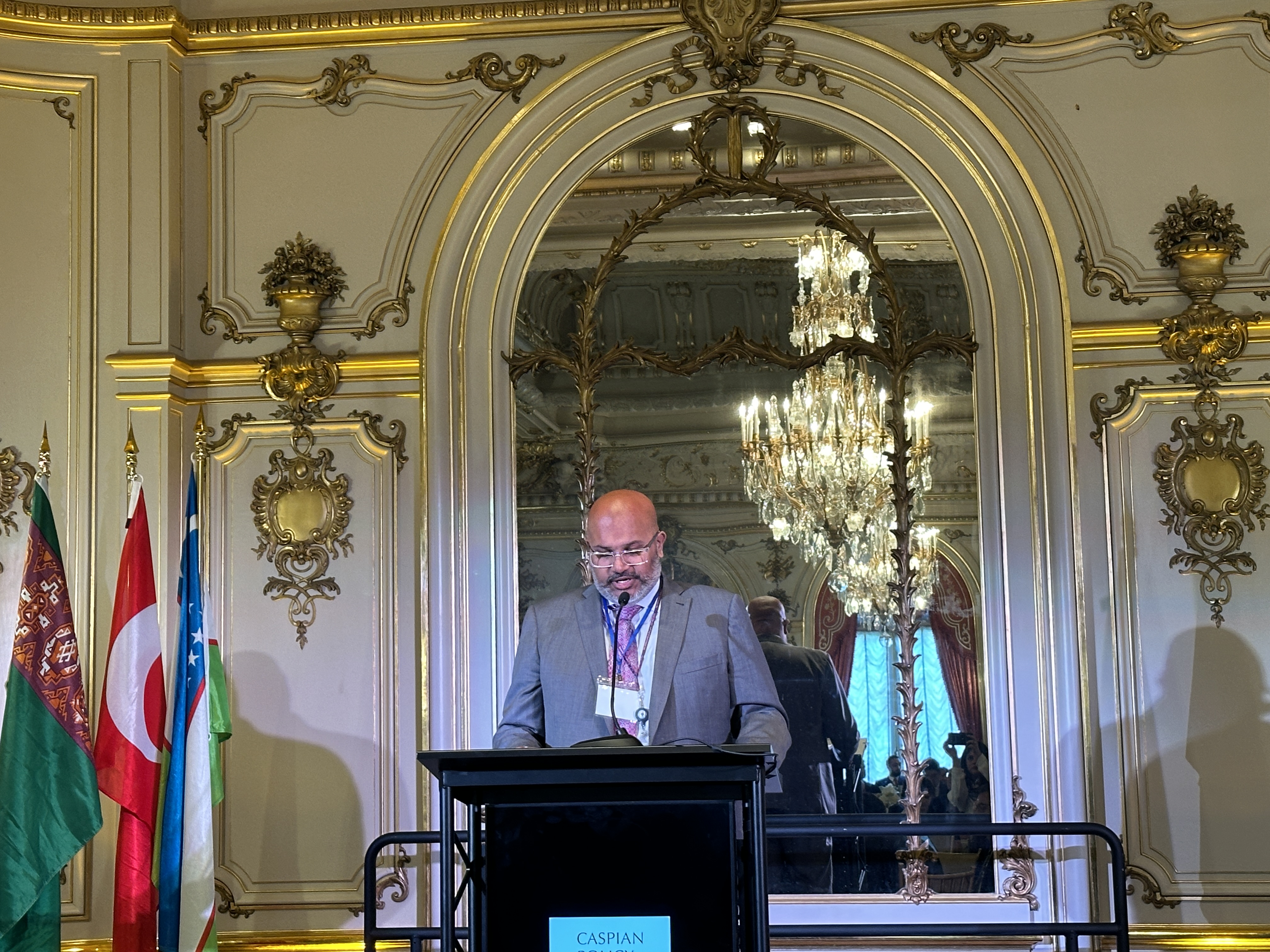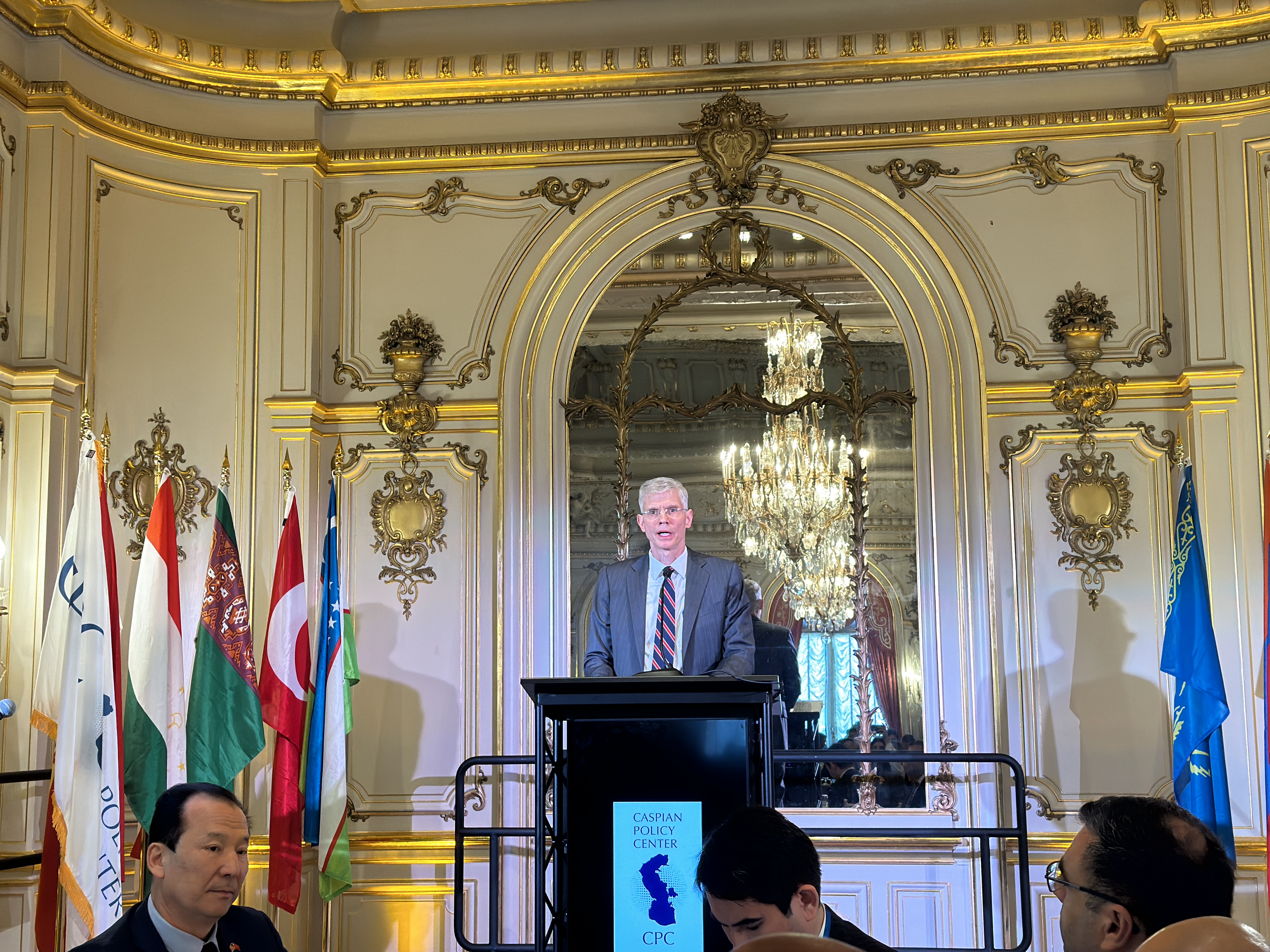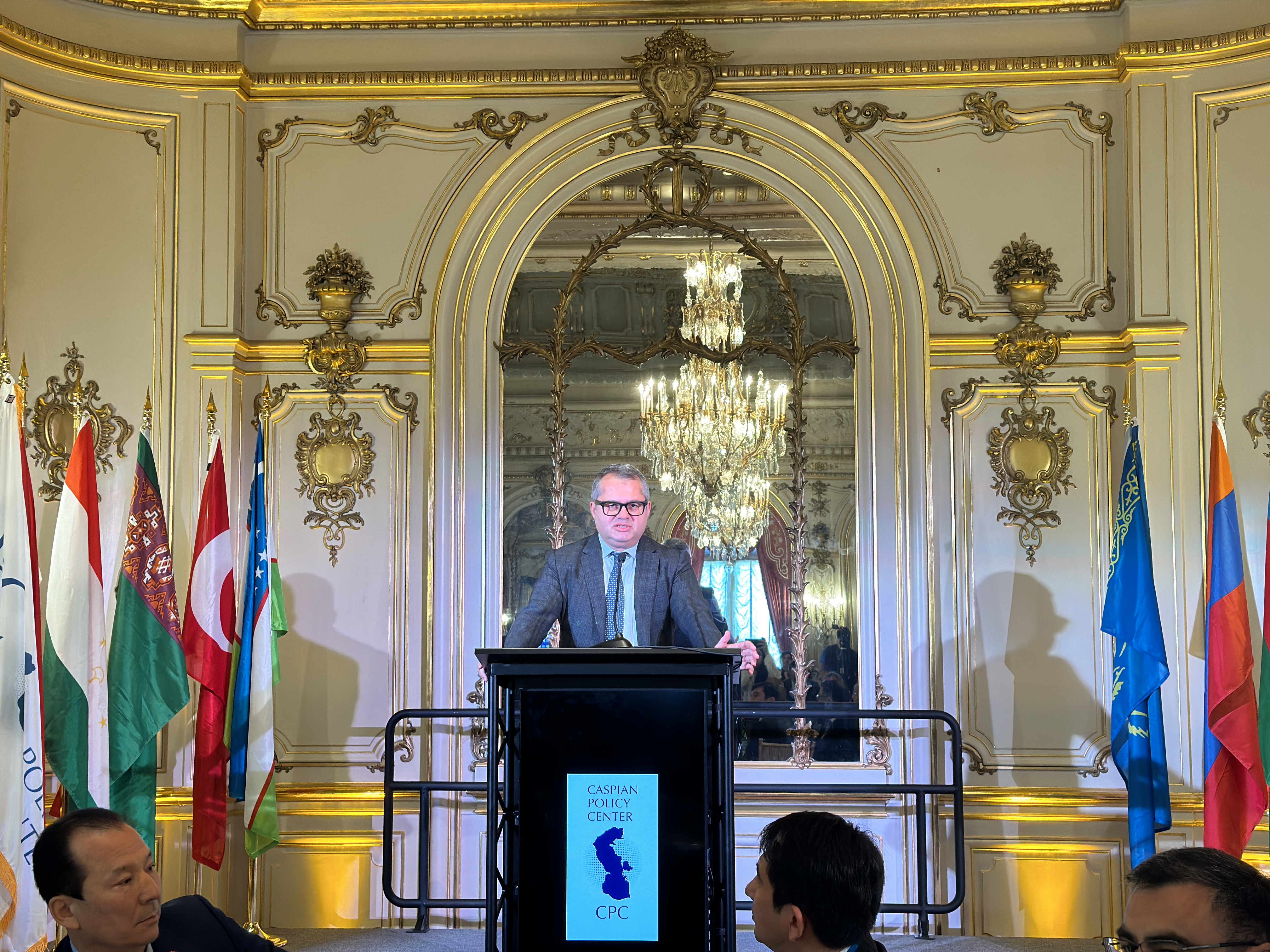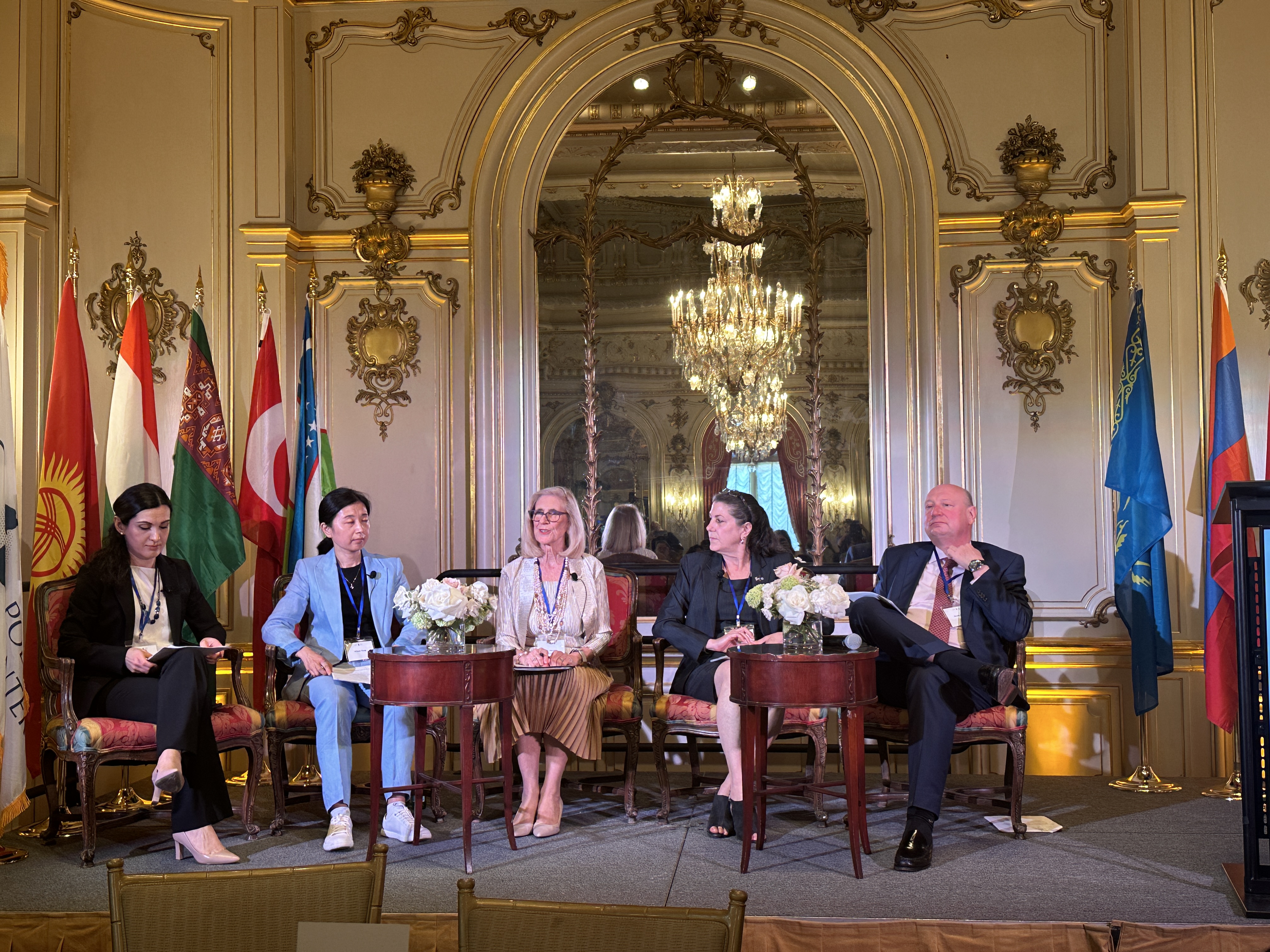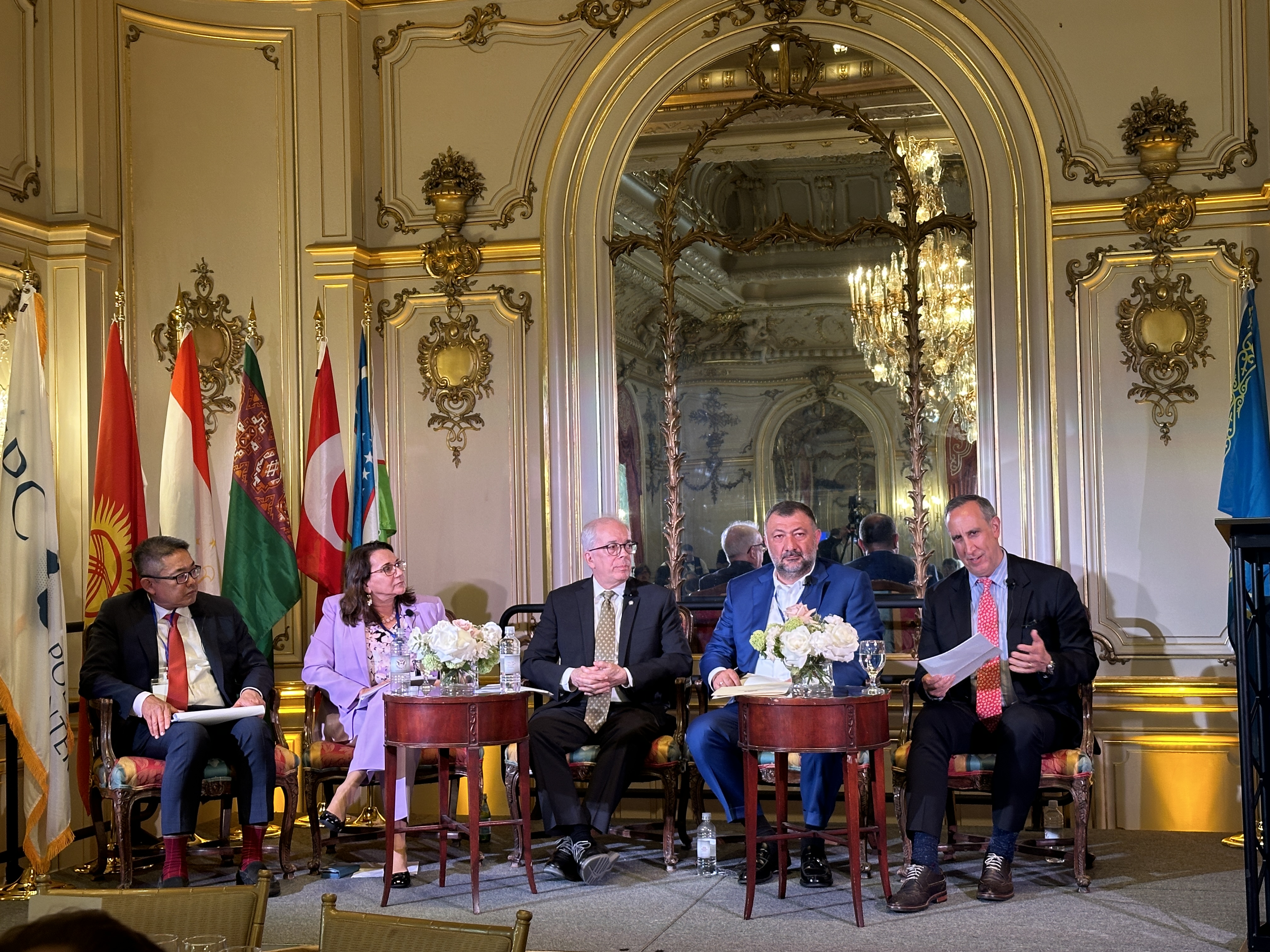The Caspian Policy Center Hosts its 8th Trans-Caspian Forum in Washington, D.C.
Recent Articles
Author: Caspian Policy Center
05/21/2024
Washington, DC, May 21, 2024 —How to Maximize the Middle Corridor was the theme of the 8th Annual Trans-Caspian Forum at the Cosmos Club in Washington, DC., hosted by the Caspian Policy Center (CPC) in partnership with the embassies of the Caspian Region. The event brought together key stakeholders from the United States and the Caspian Region to discuss and strategize how to enhance connectivity and trade across the Middle Corridor, which connects countries in the Caucasus and Central Asia to Europe, China, and South Asia.
The event commenced with welcoming remarks by Efgan Nifti, CPC President, who noted, “The developments witnessed in the Caspian region in the last 12 months have been remarkable. These include progress in the development of the Middle Corridor, ongoing reconciliation steps between Armenia and Azerbaijan, heightened levels of engagement and investment from a diverse array of global donors, the enduring ramifications of Russia’s unprovoked war of aggression against Ukraine, challenges posed by climate crises, matters concerning Black Sea security, the ongoing energy transition, and the increasing significance of critical minerals.”
CPC President Nifti highlighted that Russian trade routes are hampered by sanctions while maritime trade is constricted by hostilities in the Middle East. "The need for diversification of trade routes is obvious. This has injected new momentum into the development of regional transport connectivity in Central Asia and the South Caucasus. Further support of projects such as the Middle Corridor not only will boost political and economic relations within the region, but also will support regional goals for connectivity, energy diversification, and long-term development.”
The first keynote address was delivered by Arun Venkataraman, Assistant Secretary of Commerce for Global Markets and Director General of the U.S. and Foreign Commercial Service Global Markets for the U.S. Department of Commerce. He praised the CPC as a leading institution dedicated to scholarship, debate, and projects aimed at advancing development in the region. “The work being done here is necessary and most welcome, due to the growing global interest in the Caspian region,” said Venkataraman.
He went on to highlight the need for upgrading transport and logistical connectivity. “This doesn't mean just seaports, airports, cargo from roads and rail lines and highways, but also communications infrastructure, safety and security systems..,.” Venkataraman also explained that digital infrastructure needs in the region include interconnected and interdependent IT systems that “move goods and people more efficiently in the modern age.”
“At the Department of Commerce’s International Trade Administration, it’s our job to help businesses find partners overseas, meet their goals, and find solutions to help them advance those goals,” added Assistant Secretary Venkataraman. He noted that bilateral trade between the United States and the region over the last two years “hovered around $40 billion. U.S. exports and imports to the region were split: $20 billion in U.S. exports and $20 billion in U.S. imports.”
Ambassador John Mark Pommersheim, Deputy Assistant Secretary of State for Central Asia, provided the second keynote address. He spoke on the importance of Trans-Caspian trade for international markets and what the United States has done to support its development. “U.S. government policy towards the Trans-Caspian Region is a key element of our policies for the entire Central Asian region,” he said. “It spans more than 30 years and $30 billion in U,S, contributions to support development in Central Asia, across the wide and diverse geography and cultures that make up this amazing region....” Ambassador Pommersheim recognized increased U.S. engagement with Central Asian leaders over the past two years, which has been at a higher level than at any time in the past 30-plus years of the Central Asian states’ independence. “Our cooperation has reached a new high over the past year,” said Pommersheim. “The United Nations General Assembly New York Declaration issued by the C5+1 presidents [all five Central Asian presidents plus U.S. President Biden] is serving as a catalyst for our partnership with the region both in the C5+1 format and also bilaterally.”
Deputy Assistant Secretary Pommersheim continued, “We have an opportunity for the U.S. government to leverage enhance coordination among our international partners, including for the G7 and other like-minded partners working in Central Asia, to share this common goal of advancing regional connectivity and economic resilience in Central Asia and the South Caucasus.”
The first full panel of the Forum featured keynote addresses from high-level representatives from the Caspian region and was moderated by Ambassador (Ret.) Richard Hoagland, Chairman of the Board, Caspian Policy Center. Speakers included: Ambassador Khazar Ibrahim, Azerbaijan; Ambassador Bakyt Amanbaev, Kyrgyz Republic; Ambassador Furqat Sidiqov, Uzbekistan; Artur Grigoryan, Deputy Chief of Mission, Armenia; and Rauan Tleulin, Deputy Chief of Mission, Kazakhstan.
To improve the efficiency of the Middle Corridor, Azerbaijan’s Ambassador to the United States, Ambassador Khazar Ibrahim, said, “We need to engage with private companies in order to minimize risks and costs. Through organizations such as the Organization of Turkic States, by working on issues such as customs fees and regulations, relations among the states and all cooperation with their partners are becoming much smoother.”
Azerbaijan is also working to greatly expand its renewable energy capacity by constructing new transmission cables and new energy generation facilities. “The Caspian-EU green energy corridor proposed by Azerbaijan also serves as part of the Middle Corridor, through which not just goods, but energy and technology can also be transferred,” Ibrahaim stated.
The Ambassador additionally discussed cooperation with Georgia, Romania, and Hungary on the Black Sea Submarine Cable. “We need to also multiply the number of partners and friends, and I hope that the US will remain as one of the most important and steadfast friends in this endeavor,” Ambassador Ibrahim explained.
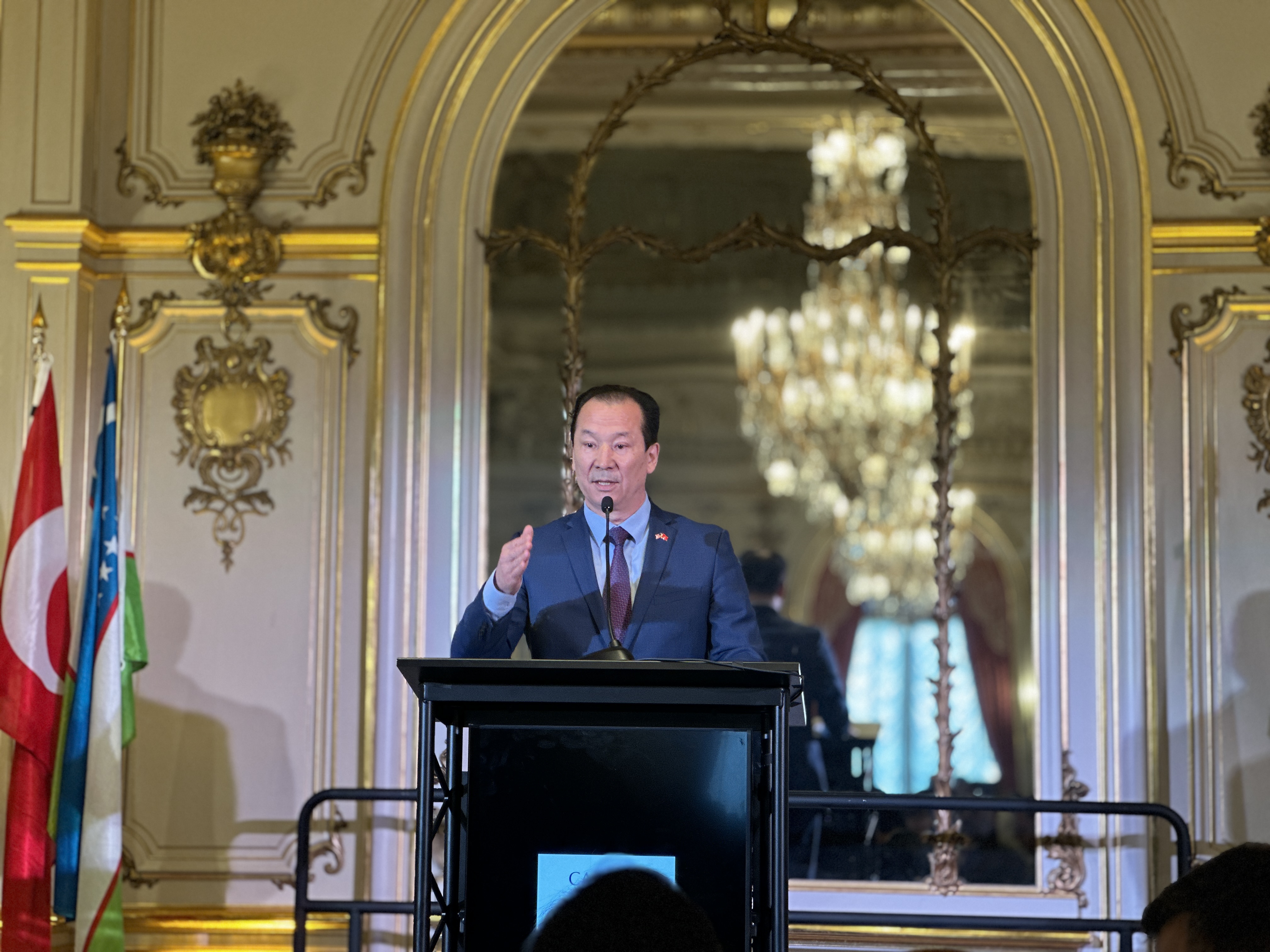
Ambassador Bakyt Amanbaev, Ambassador of the Kyrgyz Republic to the United States, spoke about the importance of expanding U.S.-Central Asia engagement and what specific roles the Kyrgyz Republic can play in Central Asia.
Ambassador Amanbaev specifically pointed to Kyrgyzstan’s water resources as a potential area of cooperation between the Kyrgyz Republic and the United States: “35% of clean water resources in former Soviet countries is located in Kyrgyzstan, which provides it with great economic opportunity.”
Noting the importance to his country of developing infrastructure connectivity, he added, “Completion of the China, Kyrgyzstan, Uzbekistan, Pakistan railway construction is of specific importance for us. We consider it the project of the century. This railway will create direct and efficient links between the countries of Central Asia, extending to Pakistan, to deliver goods to the world market.”
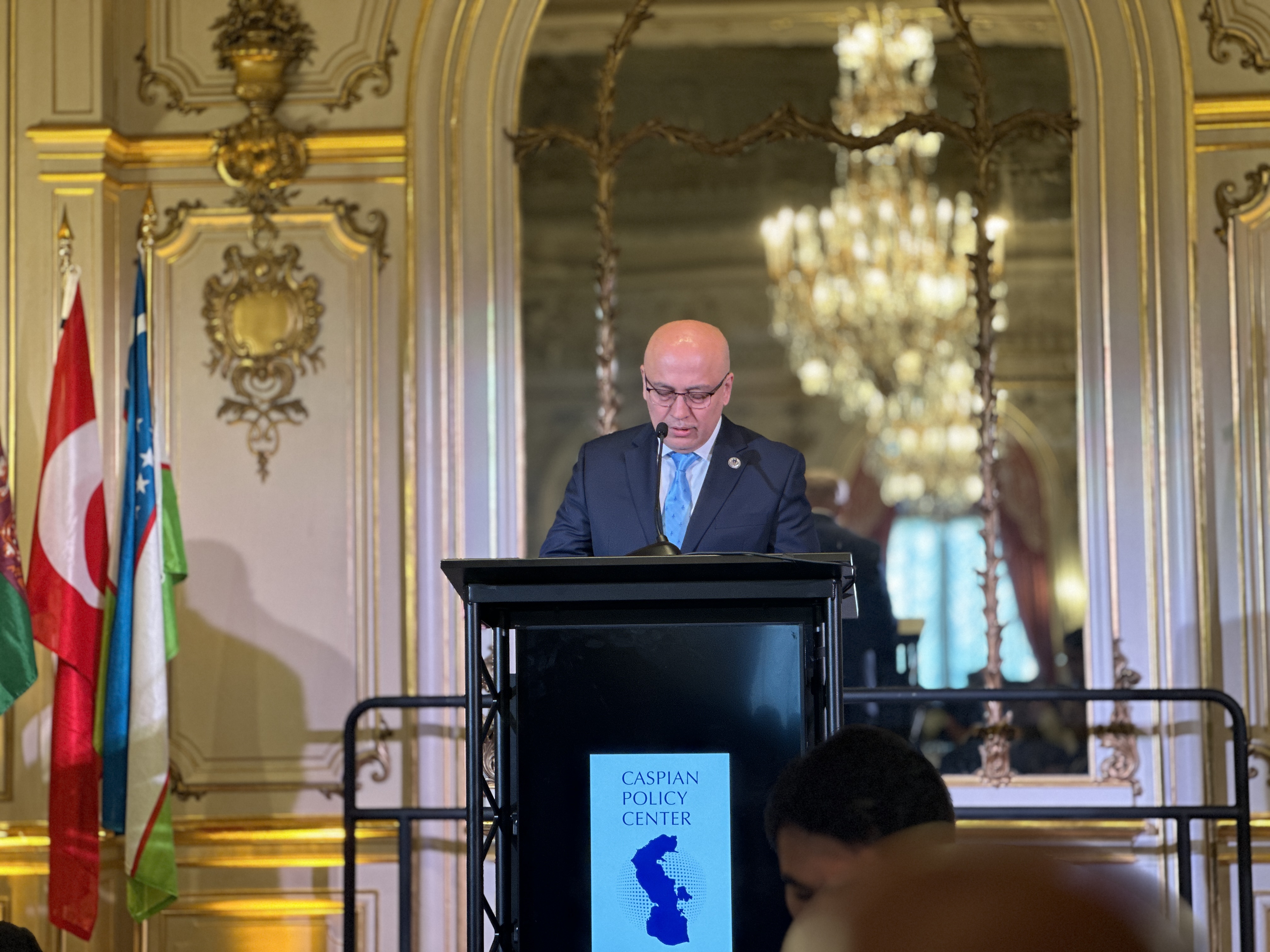 ,
,
Ambassador of Uzbekistan to the United States, Ambassador Furqat Sidiqov, also discussed how his country aims to improve regional connectivity to broaden Central Asia’s international trade relations: “Uzbekistan is committed to enhancing regional connectivity and sustainable development. We aim to improve trade and economic ties to promote regional integration.”
Sidiqov also noted, “Uzbekistan has already invested in the ports of Azerbaijan, as Azerbaijan is a getaway for Uzbekistan’s exports to European markets.... We are witnessing growing interest in American businesses doing business in Uzbekistan. There are more than 300 companies operating currently in Uzbekistan. In this regard, I believe that the American government has to repeal the Jackson Vanik amendment,” Ambassador Sidiqov said, which he referred to as an outdated Soviet-era U.S. trade policy that denies Uzbekistan normal trade relations with the United States.
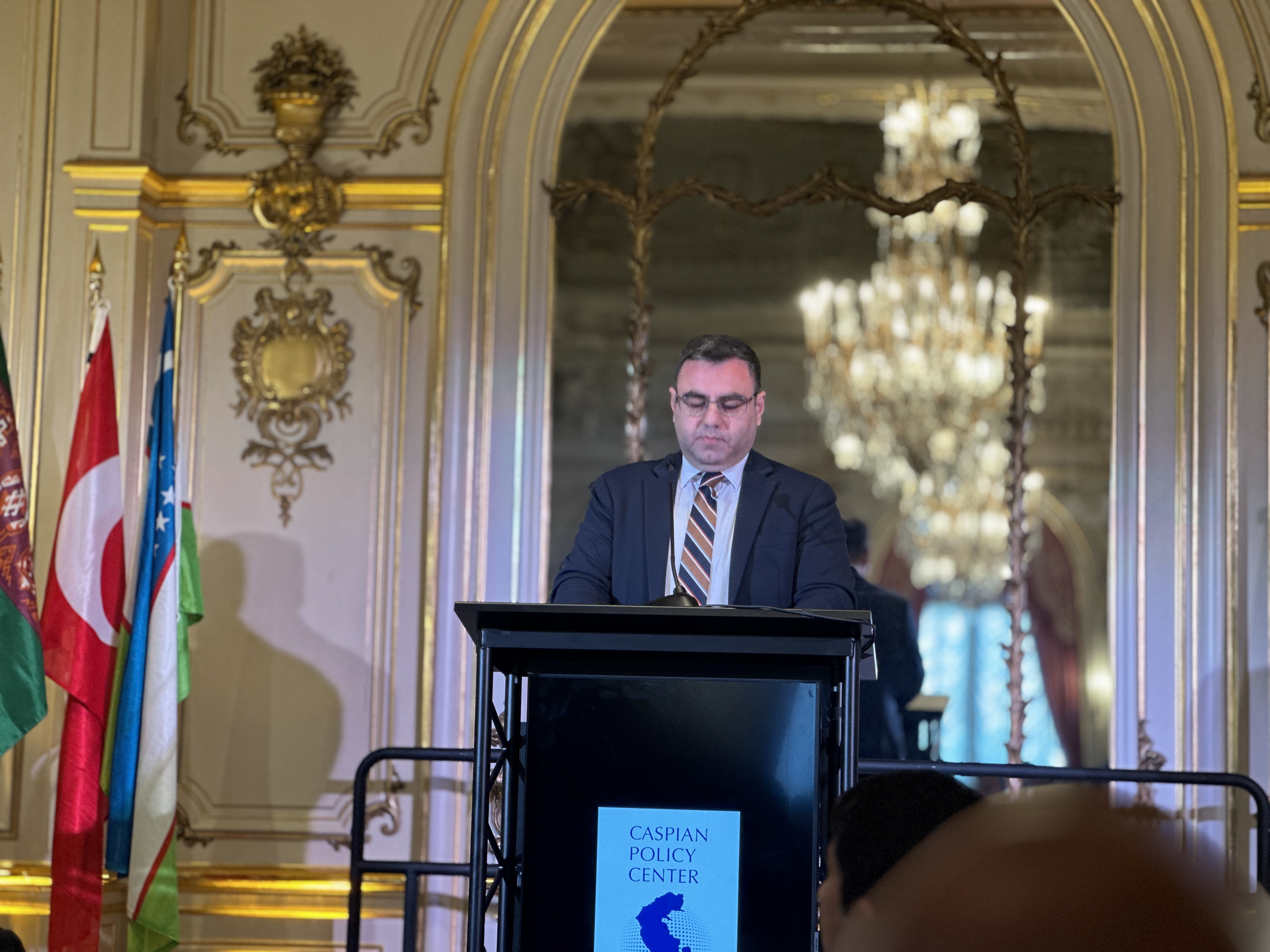
Artur Grigoryan, Deputy Chief of Mission (DCM) of Armenia, spoke about Armenia’s interest in expanding its relations with the Caspian Region, especially as the country works to diversify its trade partners.
“Armenia is rightfully interested in opening all communications and promoting transport connectivity in accordance with international law, all based on full respect for sovereignty and jurisdiction of countries,” Grigoryan said. “The re-opening of all original communication lines, on the basis of sovereignty and national jurisdiction of those principles of equality and reciprocity, can create additional interdependencies complementing the stability of the region and will contribute to the integration of the South Caucasus.”
DCM Grigoryan also commented on Armenia’s new initiative, a proposed transport route that would connect Armenia to its neighbors through new transit routes. “‘The Crossroads of Peace’ initiative, aimed at developing transport networks between Armenia, Iran, Georgia, Azerbaijan and Türkiye, offers immense benefits for all countries in our future. The initiative underscores the significance of establishing mutual trust as the conditions of peace efforts.”
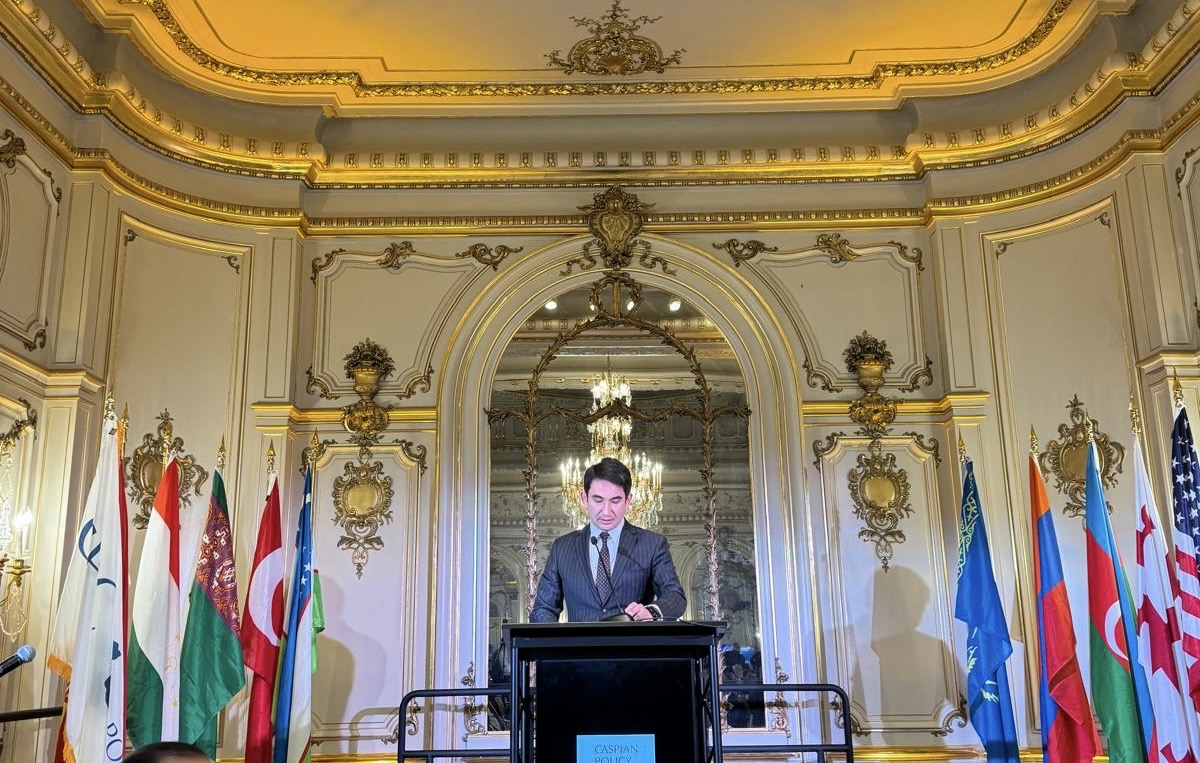
Rauan Tleulin, DCM of Kazakhstan, noted the importance of developing the Middle Corridor and laid out how Kazakhstan can boost the route’s efficiency. “Along with oil and gas, we’re focused on the transportation of common goods and critical commodities,” he said. “Last year, the volume of cargo transported through the route doubled.”
To realize the route’s potential, Tleulin suggested that the region echo the “G7 intentions to foster sustainable connectivity, trade, and energy means to enhance regional prosperity.”
Kazakhstan has already begun improvement of the Middle Corridor: “Together with Azerbaijan, Georgia, and Türkiye, we also adopted a roadmap for further eliminating of the so-called bottlenecks. Implementation of the agreements will allow increasing overall trade capacity to 10 million tons per year by 2025.”
The Forum’s second panel, Maximizing Development Impact: Prioritization & Coordination, focused on the coordination and prioritization of investments to create an efficient transport corridor. Moderated by Dr. Marsha McGraw Olive, Caspian Policy Center Board Member, the discussion included insights from Ambassador Erin McKee, Assistant Administrator for the Europe and Eurasia Bureau at the United States Agency for International Development (USAID); Henrik Hololei, Hors Classe Adviser, Directorate-General for International Partnerships at the European Commission; Tamar Satterwhite, Senior Counsel for the Commercial Law Development Program (CLDP) at the Office of the General Counsel, U.S. Department of Commerce; and Winnie Wang, the Lead Infrastructure Specialist and Program Leader for Europe and Central Asia at the World Bank.
Speakers in this panel discussed the development of the Middle Corridor as a priority for the United States and Europe. Speakers focused on tangible work being done to build connections between actors and the next infrastructure priorities to address.
“One of the key projects that we are focusing on, and bringing along also the private sector and international financial institutions, is particularly the development of the Trans-Caspian Transport Corridor into a modern, multimodal economic gateway,” said Henrik Hololei. “It’s in all our interests to make the corridor competitive, predictable, affordable, and sustainable,” he emphasized.
Hololei explained that it has never been more important to develop this corridor than now. “It’s now or never for the corridor,” he said. “During the Soviet era, the corridor was purposefully not integrated. This was a policy of division, not integration. Now, however, we have an opportunity to put it right.”
Ambassador Erin McKee picked up on the importance of the current moment for the Middle Corridor. “Russia’s unjust and reckless war has prompted several countries in Central Asia and the South Caucasus to reduce their dependency on Russia and to build new trade and energy partnerships.”
However, it will take a joint effort to establish the Middle Corridor as a viable transit route: “We absolutely recognize that the further development of the Middle Corridor must involve a multiplicity of actors from the public sector and the private sector from however many countries,” Ambassador McKee added.
There are still issues with the route that must be addressed. “In addition to investments in hard infrastructure, there is the need to invest in the soft infrastructure and focus on improving facilitation in digitalization, tracking and tracing electronic documents, smoother border crossings, and customs procedures just to mention a few,” Henrik Hololei said.
One of the largest issues is coordination among investors and the countries along the Middle Corridor. “There is a lack of coordination among the donor organizations, among the countries, and specific ministries in each country. This includes lack of information sharing,” said Tamar Satterwhite.
“Corridors are multidimensional and beyond just the transport infrastructure. They are about trade policies, trade finance logistics services, and support for the value-chain development, as well as training and education,” Winnie Wang explained. Developing this emerging corridor will require logistic and policy coordination, she added.
“One of the defining characteristics of the Middle Corridor is its multimodal nature. This hurdle can be turned into an opportunity to use all elements of the system and to decarbonize transport,” Wang added.
The panel speakers noted that several international organizations have stepped up to help countries along the Middle Corridor improve their policy coordination and transit logistics.
Henrik Hololei announced that “the EU-Central Asia coordination platform will be launched in Astana in a few weeks’ time, and the aim of the platform will be to provide a permanent framework that will drive forward the implementation of projects in Central Asia in a consistent and coordinated way, McKee explained that USAID is expanding its commitment to the Middle Corridor, having “signed a new MoU with EBRD last Tuesday, on continuing to coordinate, connecting the dots, leveraging and mobilizing what we can, and doing it in a way that amplifies the character of investments that we’re making,” McKee continued.
Winnie Wang explained that the World Bank is actively working to identify and resolve issues on the Middle Corridor. “We see great impacts when projects are designed to address specific bottlenecks and to define the level of service. To this end, at the World Bank, we have employed a number of regional and global monitoring tools to give the corridor solutions.... We estimated a cost of priority investments at about $7 billion in order to address bottlenecks,” she continued.
Tamar Satterwhite explained the role played by Commercial Law Development Program, noting that her organization focuses “on soft connectivity measures, which are equally as important as hard connectivity investments. Since 2023, we have held three regional events that have involved the C5 countries, as well as Georgia and Azerbaijan.” She also explained that CLDP has developed a joint action plan on soft connectivity measures.
CLDP is also focused on developing the corridor. “We’ve been able to launch a coordination platform among five Central Asian countries, as well as Georgia and Azerbaijan, on top of connectivity measures that are closely linked with our European partners.”
Dr. McGraw Olive concluded the panel by adding, “The key takeaway from our discussions today is that the vision is broadly the same among all partners for the Middle Corridor.”
The final panel, How to Do Business Better Along the Middle Corridor, highlighted successful business practices and opportunities in the region. Moderated by Dr. Eric Rudenshiold, Caspian Policy Center Board Member, the discussion featured Robert Scher, the Vice President of BP America; Mamuka Murjikneli, CEO of the Wondernet Investment Group; Laura Brank, Partner of Dechert LLP; and Eugene Seah, Chief Operating Officer of Baku International Sea Trade Port.
Speakers from the final panel emphasized the importance of the Caspian region for international trade and transit, but they pointed out that there are still a few legal hurdles to overcome for new opportunities to open for the private sector.
Robert Scher addressed the burgeoning business-friendly climate within the region, stating, “We at BP have found that the region is a great place to do business.... This is such an important region for us because it fits into our overall strategy of pursuing resilient hydrocarbons, while at the same time looking at opportunities to move forward on our low-carbon goals,” he added.
Scher also touched on the areas of improvement still needed for doing business in the region, specifically mentioning the opportunities for regulatory reforms and laws that are more predictable.
“One of the legal challenges is with respect to the non-transparent nature of the laws that we’re dealing with. This makes it a difficult challenge for investors to understand which laws apply at what times,” Laura Brank said.
She outlined some key investment concerns: “Bureaucratic delays and obstacles are not specific to this part of the world, but they have been in some cases problematic for investors, for example concerning the red tape present even to establish companies.... Compliance is a big concern, especially with instances of corruption. There are lots of laws being enacted now to improve this, but I do think that it takes time to educate the society and change behaviors.”
“Enforcement is another area, specifically about contractual risk. Getting judges trained and educated on business laws and allowing the system to work more smoothly have been moving forward,” Brank said. “Central Asia and the South Caucasus being so close to Russia, there is a circumvention of sanctions risks related to the war in Ukraine,” she concluded.
Turning to doing business through port systems, Eugene Seah commented on the importance of transit infrastructure in the Caspian Region: “The increasing strategic significance of the region points at the ports, where we transit cargo from Central Asia.”
Seah highlighted the growing importance of the Caspian region as one of the ripple effects of the Russo-Ukrainian War. “The war in Ukraine has highlighted the importance of Central Asian economies in terms of a few sectors – energy, fertilizers/chemicals, and metals,” he added. In these three sectors, Ukraine and Russia before the war led the global supply of these resources and their export routing, he said, adding that, with European and other countries looking to diversify their supply sources, the interest in the Caspian region has also increased drastically.
Mamuka Murjikneli added that the growing importance of the Middle Corridor is demanding an increased capacity. While the traffic is there, upgrades to the route are lagging. “We see that Central Asia itself is growing and new facilities that would be built there would require increased capacity handling for key ports.”
“Right now, the most important priority in the Middle Corridor is safety [of cargoes],” which enables smooth connectivity and transport of goods, Murjikneli added.
“Investments in the development of ports in Georgia and Azerbaijan are needed. Especially in Georgia, the demand is growing, and the construction of a deep seaport is of high importance,” he emphasized.
Eugene Seah highlighted that “U.S. and European expertise can come in helping to build the necessary infrastructure to export Central Asian energy sources to world markets.”
“Peace, security, and political stability in the region are going to be important. If you want new companies to look at the region in a different way, you have to move towards that direction,” Bob Scher concluded.
The forum concluded with a Q&A session, providing an opportunity for further discussion and collaboration among attendees. The 8th Annual Trans-Caspian Forum underscored the importance of strategic partnerships and cooperative solutions to enhance connectivity and trade across the Middle Corridor, benefiting both the United States and the Caspian Region.
